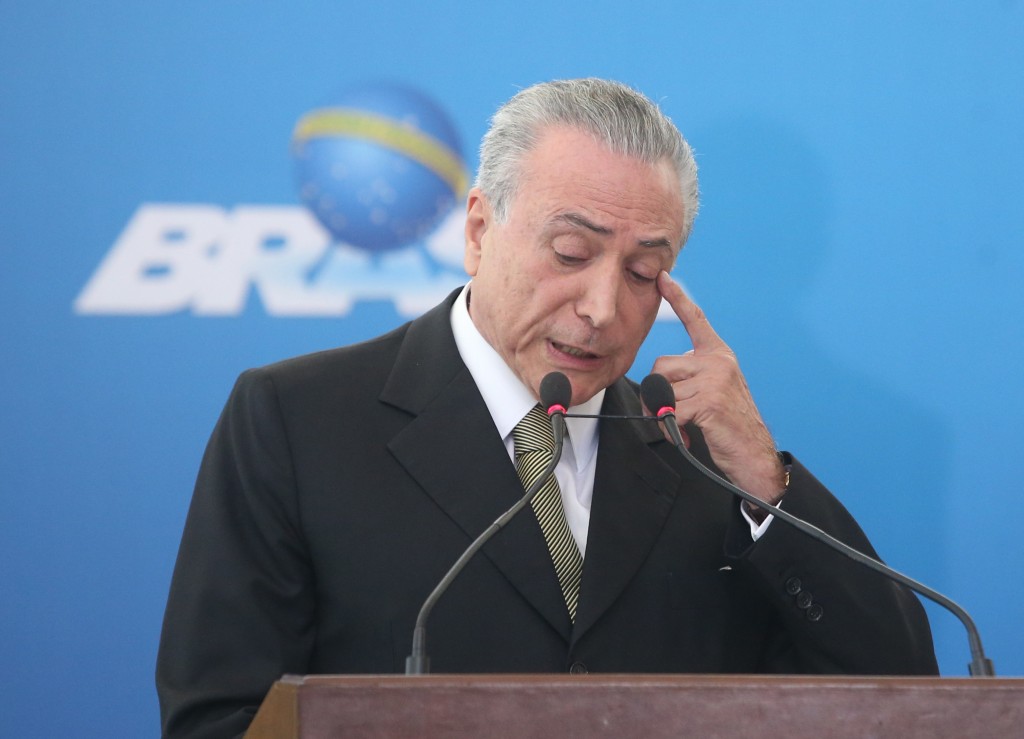Tuesday, June 6

TEMER IN TROUBLE
BRAZIL’S PRESIDENT ON TRIAL

Today, Brazil’s Electoral Court will restart a trial into allegations that impeached President Dilma Rousseff and current President Michel Temer – formerly Rousseff’s vice president – received illegal campaign funds in 2014. If proven, Mr Temer’s short tenure could come to an abrupt end on Thursday or Friday.
Prosecutors say there’s “strong and very serious proof” that the Rousseff-Temer campaign did accept illegal funding, although a judge has suggested more time may be needed to review evidence.
But even if the Electoral Court trial is postponed or even dismissed, Temer is far from out of the woods. The president is being investigated after allegations surfaced that he sanctioned bribes to disgraced former parliamentary speaker Eduardo Cunha—who was given a 15-year prison sentence in March for accepting some $40 million in kickbacks. In a significant development, a former advisor to the president was arrested on Saturday.
If Temer is removed—which, one way or another, looks likely—Brazil’s Congress must choose an interim leader to serve until elections are held next year. Finance Minister Henrique Meirelles and Tasso Jereissati, the leader of centre-right Social Democracy Party—Temer’s largest coalition partner—are shaping up as prime contenders for the role.
Whoever leads Brazil must contend with an economy recovering from two years of recession but which may be again roiled by the latest political turmoil.
ARAB STATES ISOLATE QATAR
TENSIONS HIGH IN PERSIAN GULF

The last flights from Etihad and Emirates Airways will leave Qatar today after the UAE and five other Arab countries severed relations. Bahrain, Saudi Arabia, Egypt and the UAE say they’ll cease all flights to Qatar, will eject all Qatari diplomats and ban their citizens from travelling to the country within 14 days. Libya and Yemen have also cut ties.
Tensions have been fuelled by Qatar’s continuing support for Islamist movements throughout the region, particularly the Muslim Brotherhood in Egypt and Libya and the Iranian-allied Houthis in Yemen. Saudi Arabia and the UAE perceive political Islam as a threat to their brand of authoritarianism and back secular strongmen in all three of these countries (Sisi, Haftar and Hadi, respectively). With just 300,000 nationals, Qatar has no such qualms.
Monday’s developments could have serious implications for Qatar. The country’s stock market fell more than 7% on Monday and the closure of Qatar’s only land border with Saudi Arabia, through which an estimated 40% of food imports pass, could create supply issues.
Monday’s spat is much more serious than the 2014 ambassador withdrawals. In a statement, Saudi authorities said that Qatar had “repeatedly violated” its obligations to the Gulf Cooperation Council (GCC) since 1995. If Doha does not yield to the substantial pressure it now finds itself under, it could well be booted from the GCC in the coming months.
TALKING TO THE TALIBAN
NEGOTIATIONS RESUME IN KABUL

The latest peace conference aimed at reinvigorating negotiations between Afghanistan’s government and the Taliban will begin in Kabul today. The talks are likely to be overshadowed by last week’s crippling attacks.
On Wednesday, a huge truck bomb struck central Kabul, killing 80 people in the deadliest attack since an ISIS-orchestrated bombing in April 2016. Afghan security forces accused the Taliban-affiliated Haqqani network of being behind the attack, complicating today’s talks. For its part, the Taliban denied involvement.
Hopes of a successful negotiation with the Taliban were heightened after the government successfully concluded a peace deal with powerful warlord and former Prime Minister Gulbuddin Hekmatyar last September. The government had hoped the agreement would bring the Taliban to the table. But after last week’s deadly attacks and a Taliban announcement that any peace deal with the current government would be tantamount to surrendering to the “enemy”, hopes have been dashed.
The success or failure of today’s peace conference could prove a bellwether for the Trump administration’s yet-to-be-announced Afghanistan strategy. According to American generals, if diplomacy fails, up to 5000 additional US troops may be required to break the “stalemate” in Afghanistan.
HAPPENING ELSEWHERE…
Ukrainians will be able to travel to European Union countries without a visa starting today. But visa-free travel will come with restrictions: only those with biometric passports—some three million people, or 7% of the population—are eligible and Ukrainians won’t be allowed to use the program for work reasons. Moldova and Georgia—both former Soviet states where Russia has substantial influence—have also joined the visa-free program in recent months. Ukraine’s pro-West President Petro Poroshenko called the deal a “historic” achievement that marked Ukraine’s “return to the European family. Ukraine says a final farewell to the Soviet and Russian Empire”.
An Egyptian court is expected to rule on the much-discussed Red Sea island transfer to Saudi Arabia, which has been deliberated over by multiple courts. The deal, signed last April, is unpopular with many Egyptians, who accuse President Sisi of selling Egyptian land to Saudi Arabia. Last year, Riyadh announced it would build a bridge between the two countries, although few details were announced.
South Korean authorities have raised the bird flu warning system to its highest setting starting today. The highly contagious virus was found on the island of Jeju over the weekend and follows the culling of almost a fifth of the country’s total poultry population. China has also noted a rise in bird flu cases in recent months.


